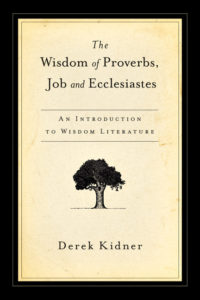We say thank you almost as much as we say hello. It’s common courtesy, acknowledging the value of a comment, a gesture, a favor, and of the worth of those around us. It binds us to our fellow humans, even if we do it somewhat mechanically.
In recent years I’ve been thinking about a deeper level of gratitude. David Brooks highlighted this for me in a column he wrote several years ago called “The Credit Illusion.” When we are in our twenties we are very impressed with our own talents and accomplishments. But by the time we are in our fifties, certainly by seventy, we recognize how much our life owes its shape to others.
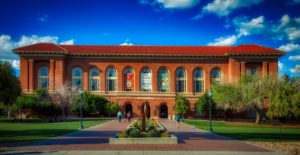 Yes, I succeeded in college but I could only go because my parents valued it, could afford it, and sent me. And that was possible only because in the last two hundred years their parents or great grandparents journeyed from Western and Eastern Europe to a country where college was possible for and valued by people like them. They avoided two major wars that ravaged their populations and came to a country that was expanding economically.
Yes, I succeeded in college but I could only go because my parents valued it, could afford it, and sent me. And that was possible only because in the last two hundred years their parents or great grandparents journeyed from Western and Eastern Europe to a country where college was possible for and valued by people like them. They avoided two major wars that ravaged their populations and came to a country that was expanding economically.
My parents provided a stable home. They provided the foundations of my faith. Yes, I took advantage of the opportunities presented to me—educationally, economically, relationally. But I didn’t create the opportunities. Others made them possible. And I have been moved to give thanks for them and their parents more and to congratulate myself less.
Practicing this type of reflection and gratitude can lead to what I call confident humility. The humility comes from recognizing that so much (most?) of who I am is not my own doing. At the same time in gratitude I am saying what I have received is good, perhaps very good, and that produces confidence.
Confident humility, in turn, gives me the freedom to listen to others. I don’t have to lead with criticism of others to show how smart I am. Whether it is about church, politics, diets, family, or how bad the Chicago Bears are, I can open myself to learn from others who have different ideas than I do.
 I don’t have to be threatened by new viewpoints or people who disagree with me because I know most of who I am came from others to begin with. Surprisingly, gratitude has thus taken me on a journey of listening and of learning new things—yes, of even learning I was wrong.
I don’t have to be threatened by new viewpoints or people who disagree with me because I know most of who I am came from others to begin with. Surprisingly, gratitude has thus taken me on a journey of listening and of learning new things—yes, of even learning I was wrong.
The end of a year and the end of a decade are good times to reflect and to be grateful. They are times to listen for the good, for the true, and for the beautiful regardless of the source.
—
photo credits: Pixabay 1778011 (University of Arizona); SecularEthos (thank you)

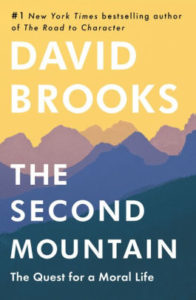
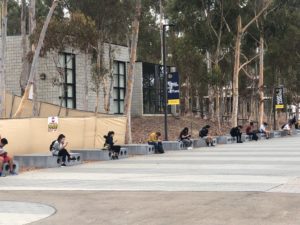 In his opening to The Second Mountain, David Brooks says he is correcting his previous book, The Road to Character. I think, however, the two are simply companion volumes. While the earlier book focuses on the valid and important work of character development that each of us is responsible for, Brooks’s newest book highlights the importance of community for who we are.
In his opening to The Second Mountain, David Brooks says he is correcting his previous book, The Road to Character. I think, however, the two are simply companion volumes. While the earlier book focuses on the valid and important work of character development that each of us is responsible for, Brooks’s newest book highlights the importance of community for who we are.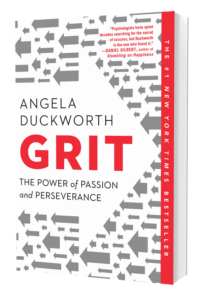
 Duckworth gives a nod to the fact (as research shows) that our environment (society, family, culture) can profoundly affect our grit. The culture of Finland, as one example, can train a whole country to be tough in adversity. So grit is not merely a matter of pulling oneself up.
Duckworth gives a nod to the fact (as research shows) that our environment (society, family, culture) can profoundly affect our grit. The culture of Finland, as one example, can train a whole country to be tough in adversity. So grit is not merely a matter of pulling oneself up.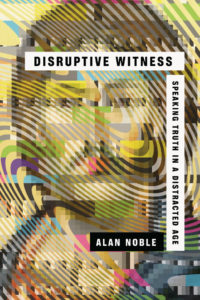
 The second part of the book looks at practices we can engage in to break or disrupt these forces—personally, as a church, and as we interact with culture. These are not suggestions for evangelism as we might typically think of them. They are more like spiritual disciplines to reorient our own lives before (or as) we engage with those outside God’s family. I could wish for more here, but Noble gives us a necessary beginning.
The second part of the book looks at practices we can engage in to break or disrupt these forces—personally, as a church, and as we interact with culture. These are not suggestions for evangelism as we might typically think of them. They are more like spiritual disciplines to reorient our own lives before (or as) we engage with those outside God’s family. I could wish for more here, but Noble gives us a necessary beginning.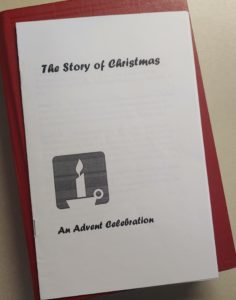 Once each December we have invited about twenty friends, neighbors, coworkers, and their children to our home for an evening. Since usually they don’t all know each other, we take a few minutes for everyone to introduce themselves and how they are connected to our household.
Once each December we have invited about twenty friends, neighbors, coworkers, and their children to our home for an evening. Since usually they don’t all know each other, we take a few minutes for everyone to introduce themselves and how they are connected to our household. In the middle we pause to let people share Christmas or holiday memories and what it all means to them. Some talk about family traditions and some about their faith experiences. The evening closes with dessert and coffee, sharing cookies and other treats that our friends have brought.
In the middle we pause to let people share Christmas or holiday memories and what it all means to them. Some talk about family traditions and some about their faith experiences. The evening closes with dessert and coffee, sharing cookies and other treats that our friends have brought. When we firmly, completely, uncompromisingly put our trust in a particular way of viewing the Bible, ironically we put ourselves at risk of disbelief. Why? Because if one brick of the structure we have built crumbles, then the whole edifice falls.
When we firmly, completely, uncompromisingly put our trust in a particular way of viewing the Bible, ironically we put ourselves at risk of disbelief. Why? Because if one brick of the structure we have built crumbles, then the whole edifice falls. 